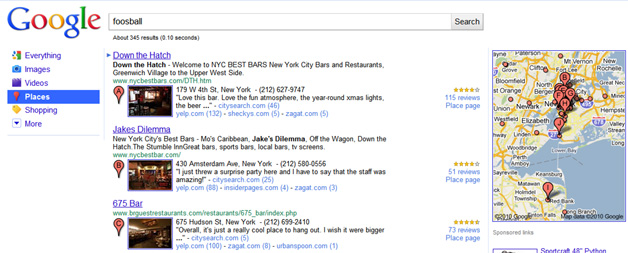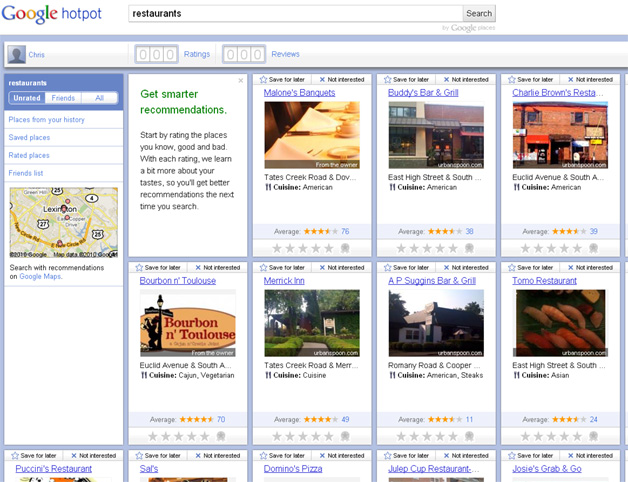Google has combined local search with personalized search, and social search to make a potentially powerful new kind of Google result that should benefit both users and businesses. These results come from a new Google product called "Hotpot", a recommendation engine designed for integration with Google Places.
The concept is simple: rate businesses based on your experience, build relationships with others to build trust (in opinion), and get a new kind of relevancy in your search results. Social and location are two of the strongest indications of relevance, at least when it comes to finding a business in the real world. You want something that is nearby and something that people you trust can vouch for. This, in concept, combines these.
The Increased Local Focus
It’s obvious that Google is placing more emphasis on local these days. Just a couple weeks ago, Google introduced Place Search, a new kind of search result that can be accessed from Google’s left panel, but unlike many of the other search options available in the panel, Google will actually return you these results for queries automatically, when it thinks you are looking for local information.

In fact, search analyst Bruce Clay just discussed Google’s increased emphasis on local at length with us, pointing out that local is basically burying traditional organic search results.
"Now, anybody that has a local result, the first organic link is down below the fold," he said. "I never expected that to happen…the organic links, they’re gone. For the last four or five months, I’ve been saying that the new page one in the search results is really positions one, two, and three. That is page one. And I think Google agrees."
Now Google has added a new and very interesting element to local results in these recommendations.
Getting Personalized
Personalization (at least when it’s done right) essentially equals relevancy. If results are personalized the best they can be, they’re going to be the results you want or need. That’s why Google is encouraging users to participate in Hotpot.
"Why rate the places you’ve been? First, your ratings will personalize your search results by customizing them according to your tastes," explains product manager Mat Balez. "Even better, when you add friends to the mix using Hotpot on your computer, your ratings will point them in the direction of the best enchiladas in town the next time they crave Mexican food, wherever they happen to be."
"Of course, this works the other way too — so to reap the rewards, you’ll want to add friends to get recommendations for the places they love," adds Balez. That brings us to…
The "Social Layer" and the Missing Ingredient
Hotpot can prove useful without the social layer. If you rate enough things, you can give Google an idea of the kinds of things you like. This is how most recommendation engines work. Think about Netflix. If you rate enough movies, you’ll get more suggestions for movies that Netflix thinks you’ll like based on those. However, when you bring friends into the equation, you get that added layer of suggestion from people you know and/or trust. It’s one thing to get a suggestion from a company that you don’t really know personally and doesn’t really know you. It’s another thing entirely to get a suggestion from your best friend or someone else you have a relationship with whose tastes may be similar.
The missing ingredient and the elephant in the proverbial room is obviously Facebook, since that’s where all your friends probably are. Google’s challenge is to change that – not to necessarily take your friends away from Facebook, but to get them using Google accounts. Fortunately, Google accounts are attached to many products, such as Gmail, Buzz, Google Docs, and perhaps most importantly (simply in terms of numbers) YouTube.
You may have more friends with Google accounts than you even realize. It’s just a matter of finding them. Google could do a better job of making that easier. The company has created the Hotpot rating app, which lets users do the rating and invite friends. This can be done from the web or from Google’s Mobile Maps on Android.

"By adding someone else as a friend, you’ll be inviting them to see more than just your Places nickname," Google explains in its help guide. "Instead of seeing your nickname tied to your ratings and reviews, they’ll see the name on your Google Profile and your Google Profile picture. When they see a recommendation, they’ll know it came from you, because they’ll see your Google Profile full name and photo in the explanation…In order for a friend to use Google Places, they need to have a Google Account."
It looks like you have to add friends by email address. It would be so much better with Facebook Connect, which Google doesn’t seem to keen on using. In fact, Eric Schmidt addressed this very fact at the Web 2.0 summit this week. Danny Sullivan’s liveblogged account of Schimdt’s words says, "One of the fundamental principles on the internet is that this kind of information is open. So I worry, as a general response, not just about Facebook, that things are developing to keep too much information private."
Schmidt may have a point, but in the meantime, the users will suffer, and it’s entirely possible that the product’s adoption will suffer as well.
Google’s angle seems to be to get people involved as they are added to their friends’ friend lists. When I sign up and add a friend, that friend will get an email with the subject "Chris Crum wants to share recommendations with you on Google Places" and a body saying:
Chris has added you as a friend on Google Places — a smarter way to discover places you’ll love. Add Chris back to see new recommendations in Google search results, on Google Maps, and on your mobile phone.
Add Chris as a friend
Google Places is powered by Hotpot, our new local recommendation engine. Every time you rate places on Google, we’ll customize your search results with new recommendations based on your unique tastes. Adding friends whose opinions you trust makes your recommendations even better. Start building your own guide to the world at google.com/hotpot.
You can invite anybody you want to with an email address, and it will retrieve your Google contacts automatically. However, probably have a lot of friends on Facebook that do have Google accounts, but you don’t necessarily know their Gmail addresses. Also, when inviting people that don’t have Gmail addresses, you’re asking them to do a lot – sign up for Google in general. This might be awkward for some, though Google clearly wants more people to have Google accounts.
Potentially Powerful, But Will People Use it?
Hotpot has the potential to be a very useful tool for search. It would probably be more useful with Facebook data, but users can still get use out of it without this. The real question is will they? Will enough people find their way to the app and rate Places? We’ll see. Those that do and get their friends to join should have some pretty relevant results. Good luck trying to crack this from an SEO standpoint.
If Google does ever get Facebook data integrated here, it might be even more of a reason for businesses to start utilizing personal profiles more (like with Facebook’s whole prioritized inbox thing). In the meantime, businesses better have their Google Places info in order.
Google indexes over 50 million "places" around the world.







 WebProNews is an iEntry Publication
WebProNews is an iEntry Publication